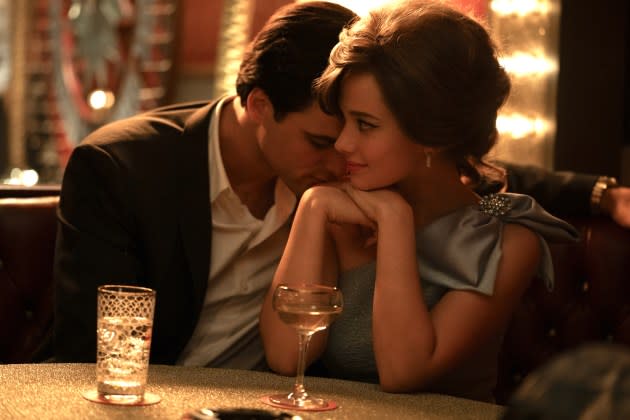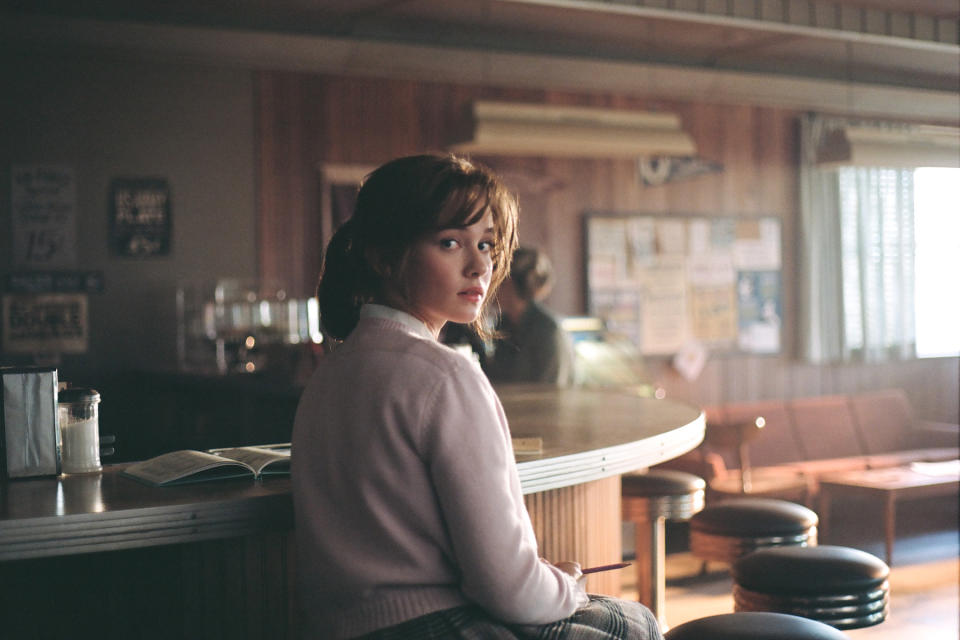‘Priscilla’ Shows Elvis’s Dark Side, and Is Sofia Coppola at Her Best
- Oops!Something went wrong.Please try again later.
- Oops!Something went wrong.Please try again later.
- Oops!Something went wrong.Please try again later.
- Oops!Something went wrong.Please try again later.
- Oops!Something went wrong.Please try again later.

They say you should never meet your heroes, but you definitely shouldn’t start romancing them in a foreign country when you’re 14 (to their 24), let them ply you with pills, dictate what clothes you wear, and trap you in a mansion while they go off to fuck starlets and groupies.
Such is the plight of young Priscilla Presley in Sofia Coppola’s Priscilla, an enchanting new film faithfully adapted from Presley’s 1985 memoir Elvis and Me. As the story goes, Priscilla Beaulieu (played by Cailee Spaeny) meets Specialist Elvis Presley (Jacob Elordi) in September of 1959 while he’s stationed in West Germany. She is just 14 years old, and he already a rock supernova, serving time in the Army to appease the patriotic fantasies of his overlord, Colonel Tom Parker. The two first cross paths at a party at Elvis’s rental home, where his eyes look past all the age-appropriate women and train on the out-of-place girl. While teenage Priscilla is understandably intoxicated by the music god’s allure, Elordi’s dead-eyed stare points to something more chilling. It’s a scene that’s equal parts meet-cute and entering the lion’s den.
More from Rolling Stone
Roman Polanski, Woody Allen and Luc Besson Cast Dark Cloud Over Venice
Richard Linklater Says Muse Glen Powell Has 'A McConaughey Quality'
“Ninth grade? Why, you’re just a baby!” he exclaims.
Despite their age difference, and his penchant for calling her “kid” or “little one” (yikes), the two soon become inseparable. And Elvis is depicted in the film as being gentlemanly toward his teen paramour, as off-putting as their courtship looks through 21st-century eyes, confiding in her about how much he misses home and his late mama, and asking (and being granted) permission by her parents to take her out on dates to the movies, or shindigs at his house.
“He just lost his mother, and he’s still grieving!” Priscilla exclaims to her worried mom (Succession’s Dagmara Domińczyk). “He trusts me!”
Before you can say “you ain’t nothin’ but a hound dog,” Elvis has his talons deep in Priscilla. He’s all she can think about for he is the sun, one of the most famous and revered men on the planet, and he’s shining brightly on her. He could have anyone, she (and her parents) wonder, so why her? Maybe he’s a weirdo who got turned on by how transgressive this is, we think. Their first kiss is set to Joan Jett’s cover of “Crimson and Clover,” one of many musical cues that Coppola — and Phoenix, her husband Thomas Mars’ band who scored the film — knock out of the park.
But Elvis is honorably discharged from the Army in 1960 and returns to the States, while Priscilla is stuck in West Germany for another year and a half. They talk and write occasionally, with Priscilla learning of Elvis’s rumored flings with Nancy Sinatra and the like through the gossip rags. She is a bit jealous, yes, but mostly yearns for when they’ll be reunited. That finally happens in the summer of 1962, when Priscilla, now 16, is allowed by her parents to visit him at Graceland, though he whisks her off to Vegas instead. It’s here where you really start to worry for Priscilla, as a pilled-out Elvis hands her amphetamines to stay awake and Placidyl (a powerful sedative) to go to sleep. He gives her a 500 mg dose of Placidyl the first time, which puts her under for two whole days. Both in his home and in Vegas, she tries to initiate sex with Elvis, but he refuses, though says they “can do other things.” For what it’s worth, the real-life Presley has insisted that Elvis never crossed this boundary with her while she was underage, both at the picture’s Venice Film Festival press conference and in her memoir, claiming that they waited to have sex until their wedding night, when she was weeks shy of 22. In Priscilla, you get the sense that Elvis suffers from Peter Pan Syndrome, and that he’s fetishized her chasteness to an alarming degree.
By the spring of 1963, Priscilla has moved into Graceland — on the condition that Elvis’s father and grandmother chaperone her, and that she finishes high school. And it doesn’t take long for things to go full Pygmalion, as Elvis chooses what outfits she can wear (and has her try them on in front of the Memphis Mafia, even though she’s still a high schooler), forces her to dye her hair black and apply eye makeup, and refuses to let her have friends over or work a part-time job at a boutique, even though he disappears for months at a time filming movies (and sleeping with his co-stars). She needs to be at his beck and call, he says, otherwise there are plenty of women (girls?) who would gladly take her place.
“It’s either me or a career, baby,” he tells her.

Spaeny, who is 25 but makes for a convincing teenager, is an absolute marvel, nailing Priscilla’s complicated mélange of emotions — the wide-eyed wonderment and youthful desire, the apprehension and fear — while Elordi’s Elvis feels more grounded in reality than Austin Butler’s pouty hip-shaker. He is sexy and charming, yes, but also dangerous and at times, terrifying. And Coppola doesn’t shy away from showing the darker side of Elvis, as we see him demeaning Priscilla, hurling a chair at her head, and nearly sexually assaulting her in Vegas as he says, “This is how a real man makes love to his woman.” (In her memoir, Priscilla wrote that Elvis “forcefully made love to me,” but she later downplayed her description of the incident.)
You couldn’t ask for a better person to handle this material than Coppola, who’s no stranger to depicting young female protagonists and the powerful men who enjoy keeping them locked in gilded cages, whether it be the Park Hyatt Tokyo, the Chateau Marmont, the Palace of Versailles or Graceland. As the daughter of Francis Ford Coppola, she’s lived it, and is uniquely equipped to show what it’s like to put a big, flawed man on a pedestal only to see that pedestal crack. Coppola augments Elvis’s hold on Priscilla through bursts of color and sound, while every costume and car looks period-perfect. She also makes the wise choice of allowing us to see Elvis entirely through Priscilla’s eyes, sidestepping the lengthy musical performances and scenes on Hollywood sets that plague more traditional biopics. This isn’t about Elvis’s musicianship; it’s about her experience with him, and few films have so vividly captured the exhilaration, ennui, and dread of falling for a star.
People may fault Coppola for dipping her toe in familiar terrain, but it’s hard to argue with the result: a transportive, heartbreaking journey into the dark heart of celebrity, and her finest film since Lost in Translation.
Priscilla will be released in theaters on Oct. 27.
Best of Rolling Stone

